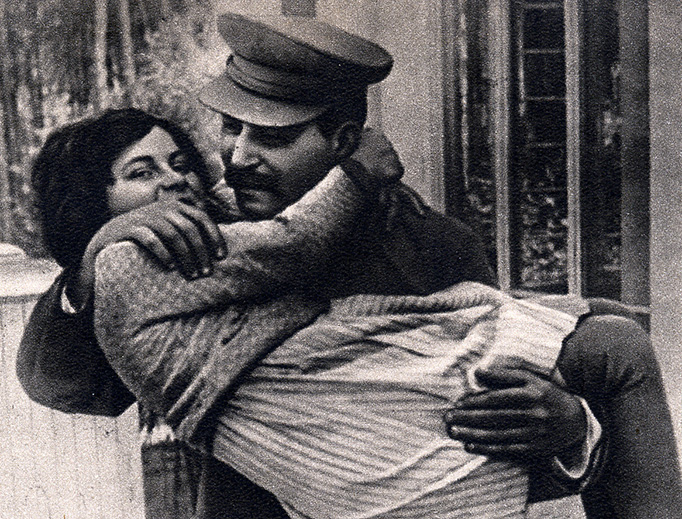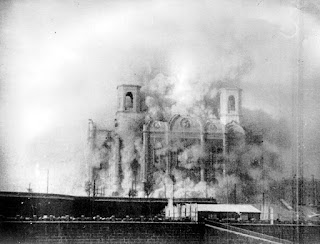‘Taken Into the Arms of Mary’ — When Joseph Stalin’s Daughter Became Catholic
“The Eucharist has given me life,” she said — and “my father would have shot me for what I have done.”

Svetlana Stalin, the daughter of the murderous dictator Joseph Stalin, renounced materialism and converted to Catholicism. Joseph would not have approved. In fact, Svetlana once reportedly told an editor of National Review that “my father would have shot me for what I have done.”
Joseph Stalin himself was raised in the Orthodox Church. His parents actually wanted him to be a priest. Unfortunately, his father abused the young Joseph mercilessly. Stalin once described his childhood as having been “raised in a poor priest-ridden household.” He came to renounce Christianity altogether, reportedly saying, "You know, they are fooling us, there is no God… all this talk about God is sheer nonsense."
While in power, Stalin did everything he could to crush Christianity, closing down thousands of churches and violently torturing, killing, and imprisoning Christians. This is the man who was reputed to have said, "One death is a tragedy; one million is a statistic" so you can imagine the merciless persecution he mounted against Christianity. Here is a photo of the demolition of the Cathedral of Christ the Saviour in Moscow on the orders of Stalin, just before Christmas 1931:
But it was all for the Marxist cause. In fact, his daughter Svetlana once wrote of her father, “Many people today find it easier to think of [Stalin] as a coarse physical monster. Actually, he was a moral and spiritual monster. This is far more terrifying. But it’s the truth.”
She was right. It is more terrifying.
Stalin established as the goal of the 'five-year plans of atheism' directed by the League of the Militant Godless eliminating all religious expression in the country. Reportedly, during just the purges of 1937 and 1938, well over 168,300 Russian Orthodox clergy were arrested, a majority of whom were shot. And that was just during two years.
But as the great singer Sting once pointed out, “The Russians love their children too,” and this was true of Stalin. Well, one of them anyway. Stalin adored Svetlana and was playful and affectionate with her. And she reciprocated. As a child she looked up to her father as a wise hero. When she was born in 1926 her father was already General Secretary of Central Committee of the Communist Party and anyone she came into contact with spoke of her father in strictly laudatory tones. She later came to understand that few dared to even whisper criticisms.
By comparison, Svetlana found her mother, Nadezhda Alliluyeva (“Nadya”) cold. Svetlana reportedly said that she couldn't remember her mother ever hugging her or even complimenting her. Then in 1932, when Svetlana was only six years old her mother killed herself. But her relationship with her father remained strong, at least for a while.
Doubts about her father would soon begin. In school, Svetlana would sometimes be handed notes by classmates whose mother or father had been “disappeared” by the state. They were begging her to pass them on to her father. It was an odd thing about the USSR that while so much pain and violence was inflicted on the people by the government many persisted in believing that Stalin was blameless and that if he knew about the abuses going on he surely would have stopped them. These children sending notes to Stalin through his daughter simply wanted to know where their loved ones were. The dictator coldly instructed his daughter not to act as a “post-office box.”
Later, Svetlana noticed that sometimes even her own relatives disappeared. Even then, Svetlana attributed it, as did so many Russians, as things which Stalin was either unaware of or unable to fix. But years later, her father would flatly tell his daughter that her relatives had been killed simply because “they knew too much. They babbled a lot,” he said, and it “played into the hands of our enemies.” You see, the official party line had been that Nadya had died of a burst appendix, not at her own hand.
When Svetlana found her first boyfriend her father considered him unacceptable and condemned him to a Gulag. Later, she attended Moscow University and received a marriage proposal from a young Jewish man. When she told her father about the proposal he coldly said, “To hell with you. Do as you like.” He told her that she could marry him but only on the condition that her husband never set foot in his house. The two had a son but their marriage broke up after a few short years. Shortly after, she married the son of a man who had been high up in the Kremlin. Joseph approved of this marriage but it too ended rather quickly.
In March 1953, Stalin died. “My father died a difficult and terrible death,” wrote Svetlana. She was there at his bedside for days, as doctors applied leeches.
Reportedly, he died raising his fist in anger. “The death agony was terrible. He literally choked to death as we watched,” Svetlana wrote. “At what seemed the very last moment he suddenly opened his eyes and cast a glance over everyone in the room. It was a terrible glance, insane or perhaps angry and full of fear of death. Then he suddenly lifted his left hand. The gesture was incomprehensible and full of menace.”
A few years after her father's death, Svetlana changed her name to her mother’s maiden name. She said the name Stalin “lacerated” her ears. She was now Svetlana Alliluyeva. Joseph Stalin had changed his last name to make it sound strong. “Stalin” means steel. The name “Alliluyeva” was a form of “Allelujah” which fit Svetlana better at that time because in 1962, she was baptized in the Orthodox Church. Svetlana rejected the materialism and violence of her father. Of her decision, she wrote, “The sacrament of baptism consists in rejecting evil, the lie. I believed in ‘Thou shalt not kill,’ I believed in truth without violence and bloodshed. I believed that the Supreme Mind, not vain man, governed the world. I believed that the Spirit of Truth was stronger than material values. And when all of this had entered my heart, the shreds of Marxism-Leninism taught me since childhood vanished like smoke.”
Svetlana was officially out of favor with the Kremlin. In fact, when she applied to the state for a marriage license to a man named Brajesh Singh she was promptly denied. Svetlana and Brajesh lived together for three years before he died in 1966. His wish had been to have his ashes spread on the Ganges. So she applied to the Kremlin for permission to travel to India. Much to her surprise, she was given permission to temporarily leave the USSR to go to India for one month.
While there, Svetlana stunned the world when on her trip she walked into the U.S. embassy and requested asylum. A stunned American on duty reportedly said to her, “So you say your father was Stalin? The Stalin?”
From there, she was flown to Rome and then on to Switzerland. She liked Switzerland but was told that could only remain there on the condition that she never speak publicly about politics. She would not agree to that. She could not. “To remain silent for another 40 years could have been achieved just as well in the U.S.S.R.,” she wrote.
In April of 1967, Svetlana Alliluyeva landed at Kennedy Airport in New York carrying a manuscript that never would have been published in the USSR. It was titled "Twenty Letters to a Friend" which was about her life in the Soviet Union. It was a huge success and a bestseller. And then, just two years later, she wrote another bestseller about her life since defecting titled “Only One Year.”
She was famous but her personal life was still a wreck. Switching from religion to religion and once again marrying, having a child, divorcing, and moving often, she found herself disenchanted with America and wanting to return home. In fact, she did return to the Soviet Union but almost instantly regretted it.
When she returned to America after over a year in the USSR she said, “I had to leave for a while to realize, ‘Oh, my God, how wonderful it is.’”
I don't know the exact year that Svetlana met Father Giovanni Garbolino, who lived in the United States but had done missionary work in Russia, but their relationship would change her life. Svetlana received a letter from Father Garbolino inviting her to make a pilgrimage to Fátima. Then later, he visited her in Princeton, New Jersey. The two were in frequent contact. Father Garbolino also gave Svetlana a cross that had been given to him by a Russian student whom he met during his missionary travels. Later, Father Garbolino had given that same cross to Col. Edwin "Buzz" Aldrin for him to take to the moon with him.
Svetlana, with the guidance of Father Garbolino, read books by Catholic authors and on Dec. 13, 1982, she converted to the Catholic faith. Svetlana wrote about her conversion: “Only now I understand the wonderful grace that the Sacraments of Penance and the Holy Eucharist produce, no matter what day of the year, and even on a daily basis. Before, I was unwilling to forgive and repent, and I was never able to love my enemies. But I feel very different from before, since I attend Mass every day.”
She added, “The Eucharist has given me life. The Sacrament of Penance with God whom … we abandon and betray each day, the sense of guilt and sadness that invades us then, all this makes it necessary to receive it frequently.”
This woman, who grew up essentially motherless, wrote, “I was taken into the arms of the Blessed Virgin Mary. ... Who else could be my advocate but the Mother of Jesus? She suddenly drew me close to her.”
She traveled to Europe and back to America often and then moved to be near one of her daughters in Oregon. In the end, she did not die raising her first in anger at the world as her father had done but peacefully in a Wisconsin nursing home in 2011 where she had enjoyed sewing and reading and surely praying.
- Keywords:
- joseph stalin
- conversion


















